The single-minded U.S. pursuit of Julian Assange as Britain proposes changes to its official secrets law shows the fierce determination of both governments to conceal their secrets, writes Alexander Mercouris.
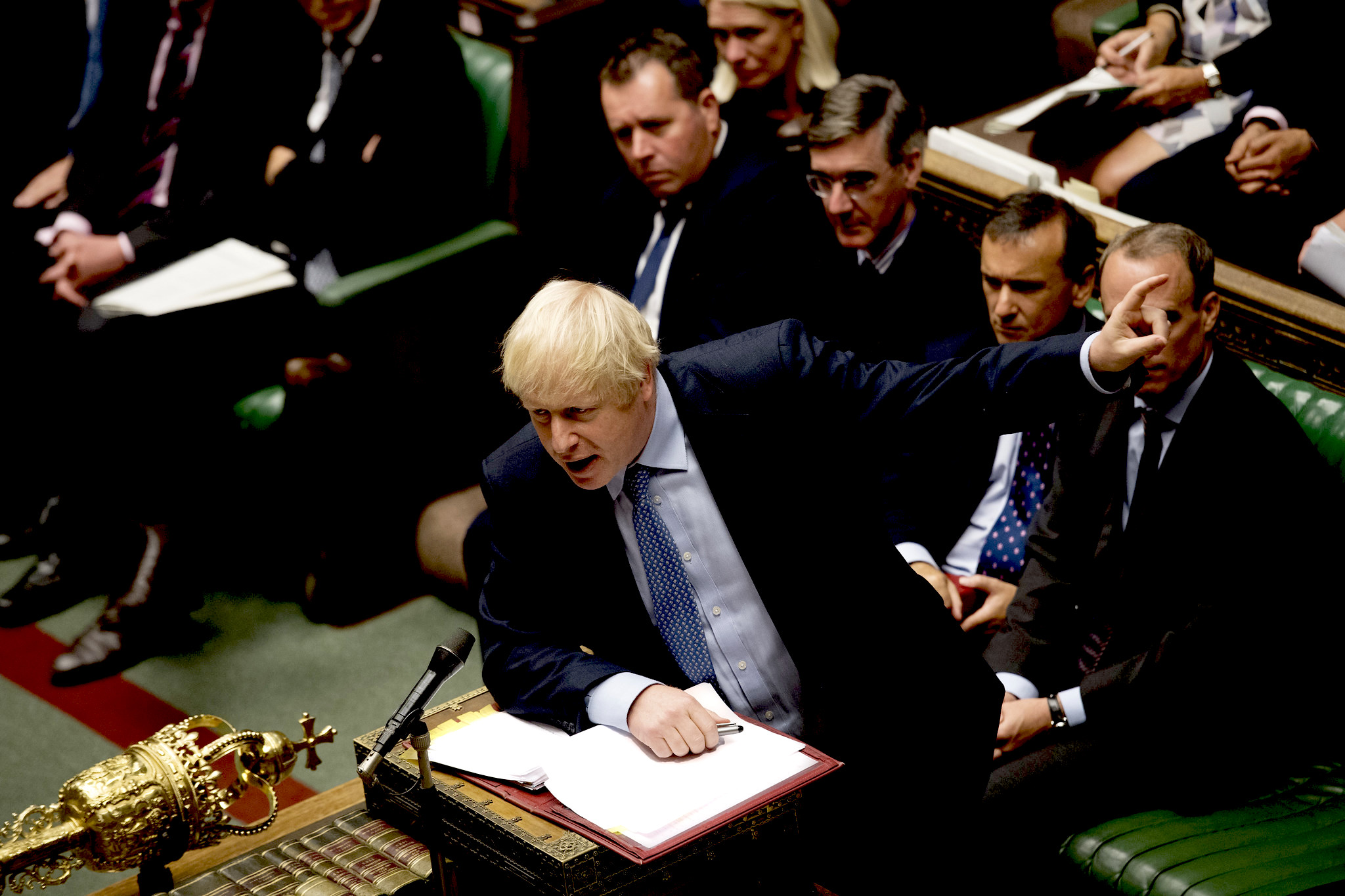
House of Commons Chamber as Boris Johnson takes his first prime minister’s questions, Sept. 4, 2019. (UK Parliament, Flickr, CC BY-NC 2.0)
By Alexander Mercouris
in London
Special to Consortium News
 Recent developments in London point to a fresh attack on whistleblowing and media freedoms in the midst of strange and disturbing developments in the Julian Assange case.
Recent developments in London point to a fresh attack on whistleblowing and media freedoms in the midst of strange and disturbing developments in the Julian Assange case.
District Judge Vanessa Baraitser of the Westminster Magistrates’ Court on Jan. 4 refused the U.S. government’s request for Assange’s extradition to the United States, where he faces charges under the Espionage Act of 1917 and in connection with allegations of conspiracy to commit computer intrusion. Baraitser however refused extradition solely on concerns she had about the state of Assange’s mental health and the risk of his suicide in a U.S. prison.
She sided with the U.S. government on every other point, including on whether it is appropriate to extradite Assange to the United States given that the charges brought against him are political in nature.
On Jan. 15 the U.S. government sought permission to appeal Baraitser’s decision to the High Court. In July, six months after the application was lodged, permission to appeal was granted.
The NYT/Charlie Savage Document
The High Court has not disclosed its reasons for granting the U.S. government permission to appeal. However a summary of the decision was provided to New York Times reporter Charlie Savage in an email from the press office of Britain’s Crown Prosecution Service. Savage confirmed to Consortium News that the email circulating on the internet is authentic.
US Grounds of Appeal
It reads as follows:
Email from CPS Press Office to Charlie Savage, New York Times, July 7, 2021: We don’t have a statement but we’re able to share an extract from the judgment today.
The U.S. has been granted limited permission to appeal, it is limited as they were granted permission on 3 out of 5 grounds. They were granted permission on a), b) and e) and refused permission on c) and d).
a. The first is that the judge made errors of law in her application of the text under section 91 of the 2003 Act. Had she applied the test correctly she would not have discharged Assange.
b. The second is that the judge, having decided that the threshold for discharge under section 91 was met, ought to have notified the requesting state of her provision view, so as to afford it an opportunity of offering assurances to the Court.
c. The third is that the District Judge, having concluded that the principal psychiatric expert called on behalf of the defence (Professor Kopelman) had misled her, on a material issue, ought to have ruled that his evidence was inadmissible. Alternatively, if it could be said that his lack of independence went to weight rather than admissibility, the District [Judge] ought to have attributed no, or far less, weight to his opinion as to the severity of Mr. Assange’s mental condition than she did (a fortiori when two, additional and wholly independent, experts were of a different opinion). Had she not admitted that evidence or attributed appropriate weight to it, the District Judge would not have discharged Mr. Assange pursuant to section 91.
d. The fourth ground is that the District Judge erred in her overall assessment of the evidence gong to the risk of suicide.
e. The fifth ground is the United States has provided the United Kingdom with a package of assurances which are responsive to the District Judge’s specific findings in this case. In particular, the United States has provided assurances that Mr. Assange will not be subject to SAMs or imprisoned at ADX (unless he were to do something subsequent to the offering of these assurances that meets the tests for the imposition of SAMs or designation to ADX). The United States has also provided an assurance that the United States will consent to Mr. Assange being transferred to Australia to serve any custodial sentence imposed on him.
Analysis of the Email
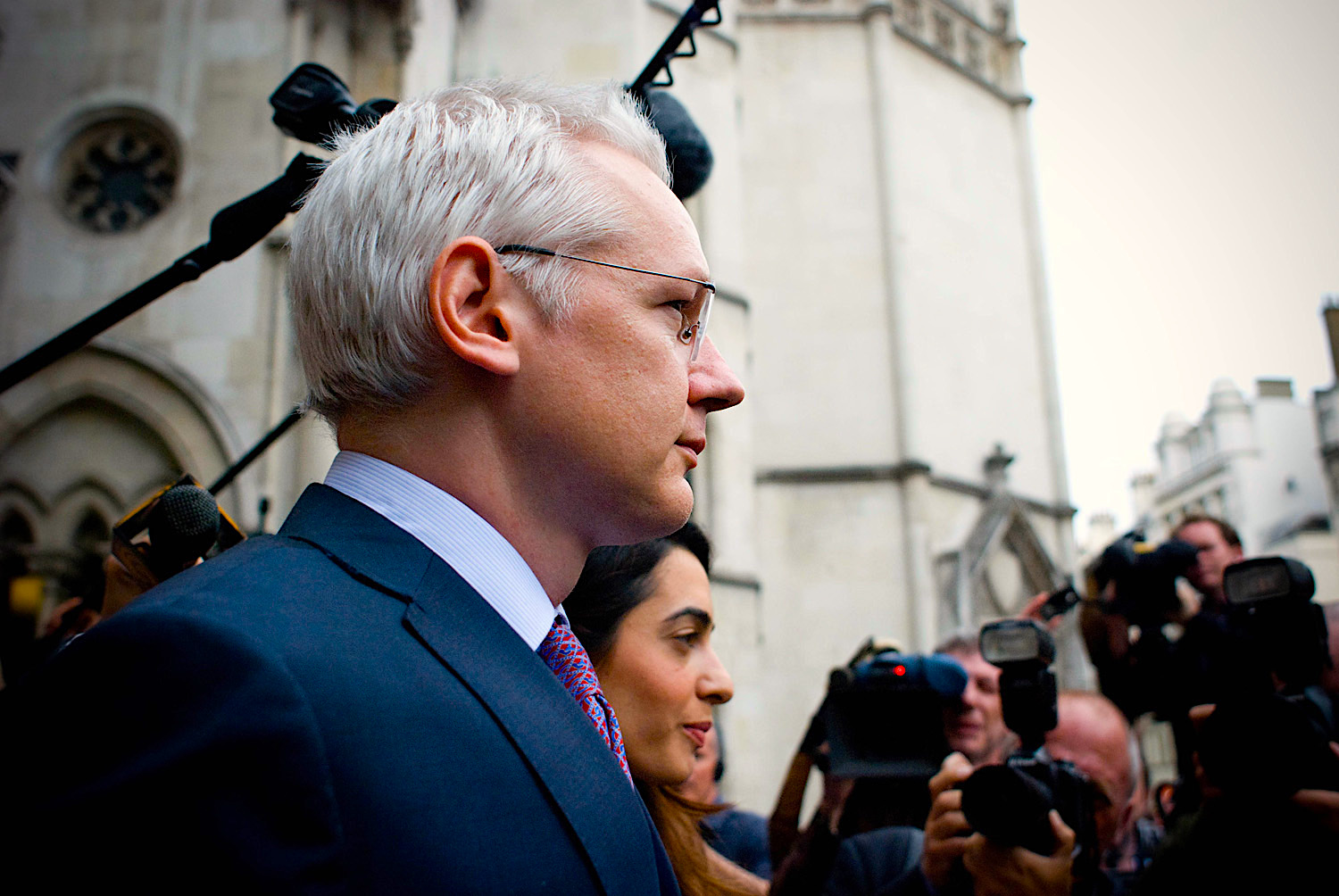
Julian Assange outside British Supreme Court, 2011. (acidpolly/Flickr)
Grounds a) and d) are typical “bookend” drafting provisions, such as barristers frequently insert into applications for permission to appeal. They simply say that Baraitser made mistakes and was wrong to refuse Assange’s extradition.
Ground b) is unusual and important. Though it is not substantive, it is necessary in order to make it possible for the U.S. to argue the far more important Ground e).
The substantive grounds of appeal are indeed Grounds c) and e).
The U.S. case on appeal is (1) that Baraitser should have rejected the evidence of Professor Kopelman, and rejected his findings about Assange’s fragile mental health and risk of suicide, and (2) that Assange, if extradited to the U.S., and convicted and imprisoned there, will not be subject to SAMs or imprisoned at ADX, and may even be sent to Australia to serve his sentence there, so that Baraitser’s concerns for his life and health were misplaced.
According to Assange’s lawyers, the High Court in July, when granting the U.S. permission to appeal, rejected criticism of Baraitser’s decision to accept the evidence of Professor Kopelman and declined to reopen discussion of the state of Assange’s mental health. The appeal was to be limited to reviewing the conditions of Assange’s possible imprisonment in the U.S.
The High Court’s decision as set out in the Savage email is identical and fully consistent with the way Assange’s lawyers have described it.
Weakness of Grounds of Appeal
In truth, both grounds of appeal look threadbare.
It is well established practice in the English courts that it is the trial judge who is the judge of the evidence, and that an appeal court will not normally interfere with, or second guess, the trial judge’s assessment of the evidence, unless the trial judge’s handling of the evidence was obviously or egregiously wrong.
It follows then that it is up to the trial judge, after hearing a witness (including an expert witness), to decide what weight to place upon the evidence of the witness. An appeal court usually will not question the trial judge’s assessment.
There seems to be no good reason why the High Court would want to interfere in Baraitser’s assessment of Professor Kopelman’s evidence.
Please Support Our Summer Fund Drive!
Throughout the entirety of the extradition hearing, the U.S. government repeatedly disputed the competence and impartiality of Assange’s expert witnesses, and repeatedly sought to have their evidence excluded. Baraitser decided to hear these witnesses, but on the great majority of issues she sided with the U.S. government against the witnesses.
But in the case of Professor Kopelman, after hearing his evidence, and after hearing what the U.S. government’s lawyers had to say about him, and what the other experts had to say, she nonetheless sided with Kopelman. This was partly because other evidence corroborated what he had to say.
There does not seem to be anything obviously or egregiously wrong with this approach. There is no reason therefore why the High Court would want to interfere with it.
US Promises
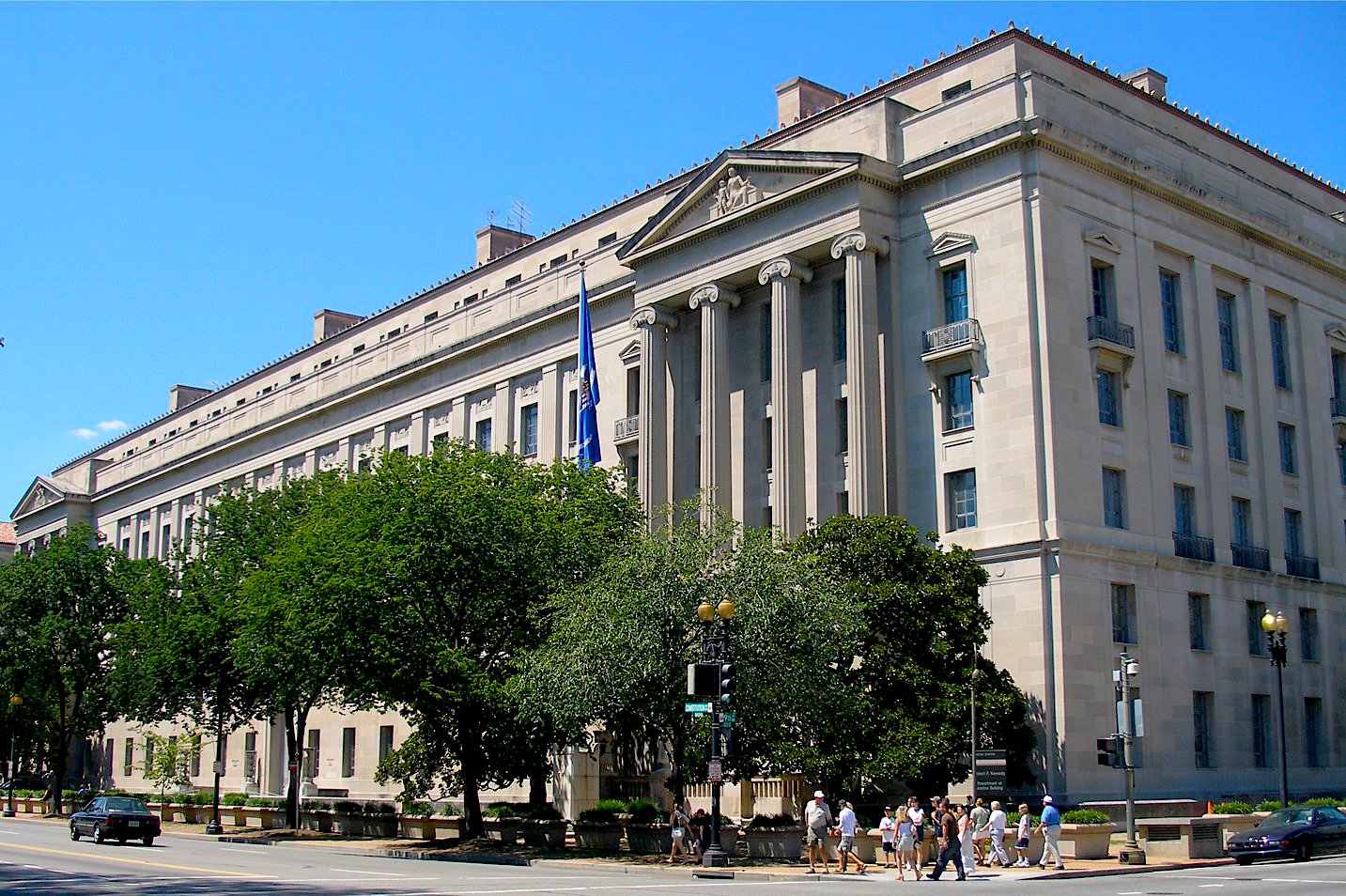
U.S. Department of Justice headquarters in Washington. (CC BY-SA 3.0, Wikimedia Commons)
As to the “assurances” the U.S. is now giving about the sort of treatment Assange might get if he were extradited to the United States, there is apparently U.S. case authority that says the U.S. is not legally bound by such “assurances,” which become unenforceable once the extradition has taken place.
The “assurances” are anyway qualified. The U.S. says they are conditional upon the U.S.’s assessment of Assange’s future behaviour.
There is in fact precedent of the U.S. failing to honour “assurances” it has given once an extradition has taken place.
This ground also faces the fundamental objection that the U.S. is seeking to give these “assurances” after the hearing at which they should have been given in the first place. Coming as part of an application to the High Court makes the “assurances” new evidence, which is generally inadmissible on appeal.
The U.S. is arguing that Baraitser should have told the U.S., during the hearing but before her decision, of her intention to refuse the extradition request because of her concerns for Assange’s life and health if he were to be imprisoned in the U.S.. The U.S. would then have been in a position to give its “assurances,” which would have allayed her concerns.
That shifts the responsibility for the presentation of evidence away from the parties in the case and onto the Court itself.
It is by no means unusual for a judge over the course of a hearing to express concerns and invite representations about them from the parties. However that does not detract from the overriding responsibility of the parties to prepare their case properly, and to provide their evidence to the Court in a timely way.
The entire initiative throughout the case has been with the U.S. The U.S. has had years to prepare its case with limitless resources to do so. It was expertly advised when preparing and presenting its case by the British lawyers who represent it, lawyers who are instructed by the Crown Prosecution Service.
Assange’s counsel, by contrast, have had to prepare their client’s case in drastically shortened timeframes, with severely limited resources and curtailed access to their client in Belmarsh prison. They have also had to deal with a cascade of succeeding indictments, the last of which hit them on the eve of the hearing that shortened even further their already limited time to prepare.
Assange’s health problems are well known, and have been widely and publicly discussed, and it was a foregone conclusion that his lawyers would raise the topic of his health and of the effect upon it of U.S. prison conditions in a bid to prevent his extradition. The risks to life and health caused by conditions in the U.S. prison system have been successfully brought up in other cases to defeat U.S. extradition requests, and it was a foregone conclusion that the same would happen in Assange’s case.
There is therefore really no excuse for the U.S.’s failure to give its “assurances” to Baraitser at the hearing.
US Granted Permission to Appeal on Only Limited Grounds
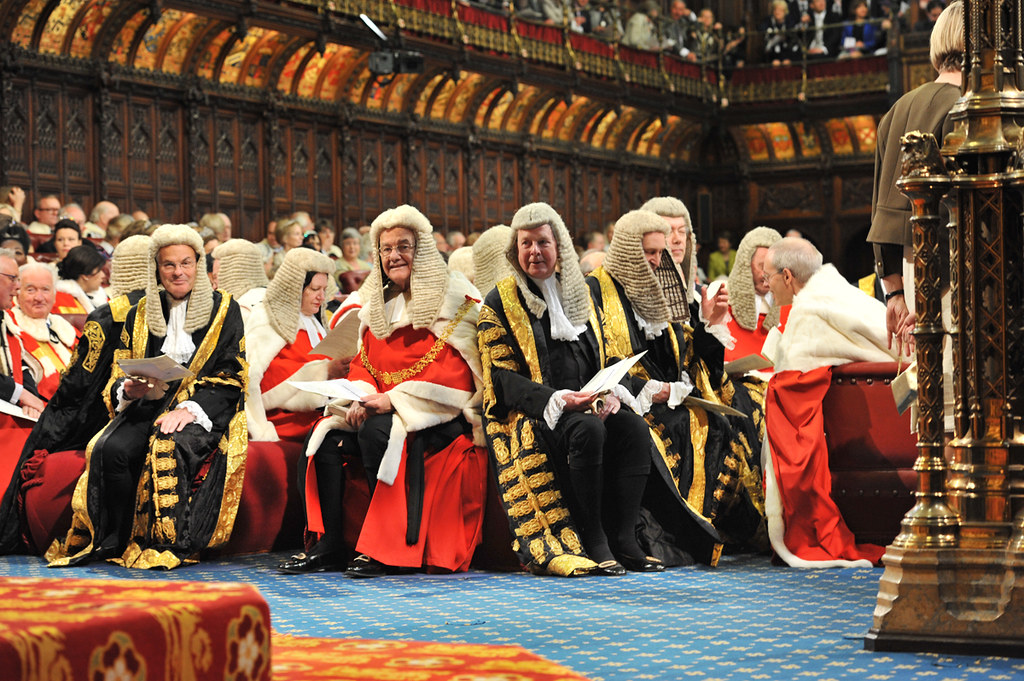
Members of U.K. judiciary in Lords Chamber ahead of queen’s speech in 2013. (UK Parliament, Flickr, CC BY-NC 2.0)
It is the weakness of the U.S.’s case with respect to the ‘assurances’ that may explain the latest procedural twist in this extraordinary case.
The High Court presumably granted the U.S. permission to appeal on the issue of the ‘assurances’ because there is an arguable point of law, though a very tenuous one, as to whether or not Baraitser ought have made known during the hearing her concerns about U.S. prison conditions and invited representations from the U.S. in order to obtain ‘assurances’ about them. It could be argued that her failure to do so meant that she made her decision without having heard the full facts.
The High Court however refused the U.S. permission to appeal on the question of Baraitser’s decision to accept the evidence of Professor Kopelman and her assessment of the state of Assange’s mental health because the point looks unarguable. As the trial judge Baraitser appears to have acted fully within her rights to hear Professor Kopelman’s evidence, and to place such reliance on it as she considered appropriate.
The difficulty for the U.S. is that an appeal based on the issue of the “assurances” looks threadbare, both because the “assurances” themselves are unconvincing, and because there is no real excuse for the U.S.’s failure to give them to Baraitser at the hearing without her prompting.
Accordingly the U.S. is now once again trying to reopen the issue of the state of Assange’s mental health by challenging the High Court’s decision to refuse permission to appeal on this issue.
This suggests that the U.S. doubts it can win the appeal and get Assange extradited on the issues of the ‘assurances’ alone.
US Challenges High Court — Aug 11 Hearing
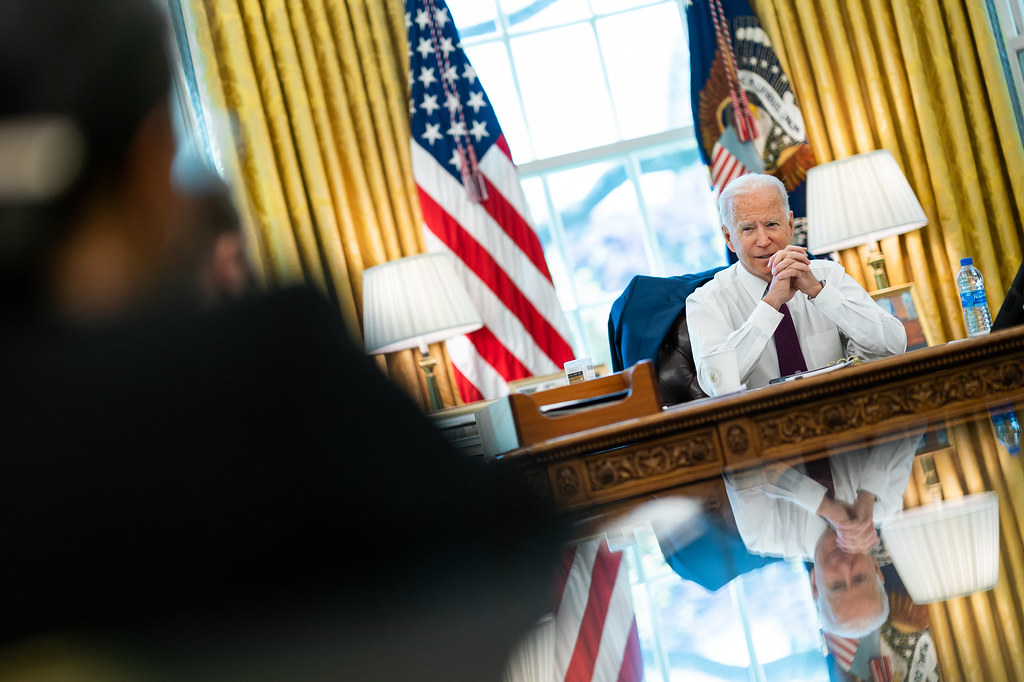
U.S. President Joe Biden in Oval Office, April 27. (White House, Adam Schultz)
This challenge will be decided at a hearing in the High Court, which will take place on Aug. 11 in the middle of summer holidays, when most judges are on leave and only urgent hearings take place.
The practice of the High Court is that an initial application for permission to appeal is made in writing. The High Court decides in writing whether to grant or refuse permission. If permission is refused then the party which is seeking permission to appeal can in some cases ask for the decision to be reconsidered at an oral hearing.
The U.S.’s decision to ask the High Court to reconsider its refusal to grant permission to appeal on the issue of Assange’s mental health is therefore procedurally proper. However it is unusual, especially when the party making the request has been granted permission to appeal on another ground.
This is what the U.S. has done, and moreover it has been able to get the hearing to decide the point listed in August, during the summer vacation.
Uncompromising US Stance in Assange Case
These actions do not just speak of doubts about the prospects of the appeal. They also testify to the U.S. authorities’ relentless determination to have Assange extradited to the United States. As a result they contest every issue and will exploit every procedural device to achieve their end.
This uncompromising attitude doubtless explains the otherwise inexplicable delay between the lodging of the appeal in January, and the decision to grant limited permission to appeal in July.
Whilst I obviously cannot say for sure, it seems to me as if this delay speaks of tense written exchanges stretching over many months between the U.S. government’s lawyers and the High Court, with the lawyers seeking to persuade a skeptical High Court to grant permission to appeal notwithstanding the weak grounds of appeal.
In the event, even when permission to appeal is eventually granted on one ground, the U.S. still insists on challenging the decision to refuse permission to appeal on the other.
This refusal to take no for an answer speaks of an important fact about the Assange case. Those who doubt its importance and who complain that it is being given a disproportionate amount of attention should note that the U.S. government does not share their view. On the contrary, its single-minded determination to have Assange brought to United States shows the great importance it attaches to the case.
Proposed Changes to UK’s Official Secrets Law
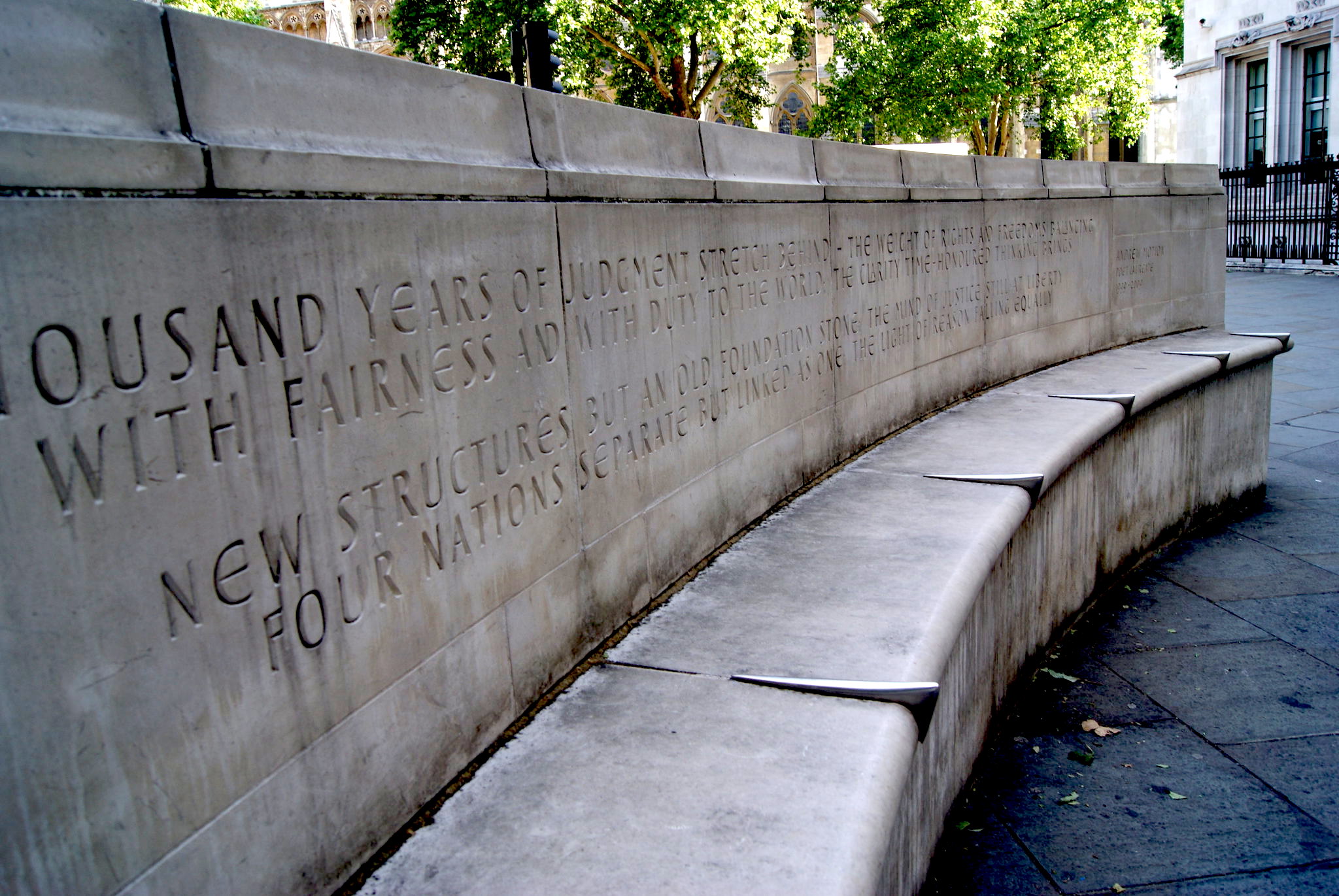
“Here Justice sits and lifts her steady scales” — from Poet Laureate Andrew Motion’s “Lines for The Supreme Court” (1999–2009) which is engraved on this bench opposite the entrance to Middlesex Guildhall. (smuconlaw, Flickr, CC BY-SA 2.0)
These events in Assange’s case are taking place at the same time as Official Secrets law in Britain is taking a dark turn.
Joe Lauria, editor of Consortium News, has discussed the history of Official Secrets law in the United States and Britain. In his articles, Lauria shows how there has been a consistent trend for Official Secrets law in both countries to become ever more restrictive and arbitrary, with each country appearing to copy the worst practices of the other.
This pattern has now taken an ominous twist with the publication in Britain of a government consultation paper, which clears the way for what is presented as a major ‘reform’ of Official Secrets law.
Outlawing Whistleblowing; Drastically Restricting Press Freedoms
The consultation paper makes troubling reading. Though its text focuses on whistleblowers, it references back to the Official Secrets Act 1989, and its proposals also directly affect journalists.
Whistleblowing & Media Disclosure Equated with Espionage
At page 19 the consultation document equates unauthorised disclosure and publication of classified information by a whistleblower or journalist with espionage for a foreign power:
“…..we do not consider that there is necessarily a distinction in severity between espionage and the most serious unauthorised disclosures…..Although there are differences in the mechanics and motivations between espionage and unauthorised disclosure offences, there are cases where an unauthorised disclosure may be as or more serious, in terms of intent and/or damage.”
Extra-Territorial Reach of Prosecutions
At page 23 it proposes, in imitation of the U.S. Espionage Act 1917, amended in 1961, that the territorial reach for prosecutions for disclosure and publication of classified information should be extended overseas. A whistleblower or journalist who discloses British classified information in a foreign country can be prosecuted for doing so, even if he or she is not a British citizen:
“The government agrees that there is a need to change the territorial extent of the offences….to bring into scope British citizens and those with a right to remain in the UK, when overseas…..
….There may be circumstances in which the Crown should be able to consider prosecution against non-British citizens for unauthorised disclosure, who have caused damage through their disclosure, which we will consider further.”
Public Interest Defence Abolished; Government to be Sole Judge of Public Interest
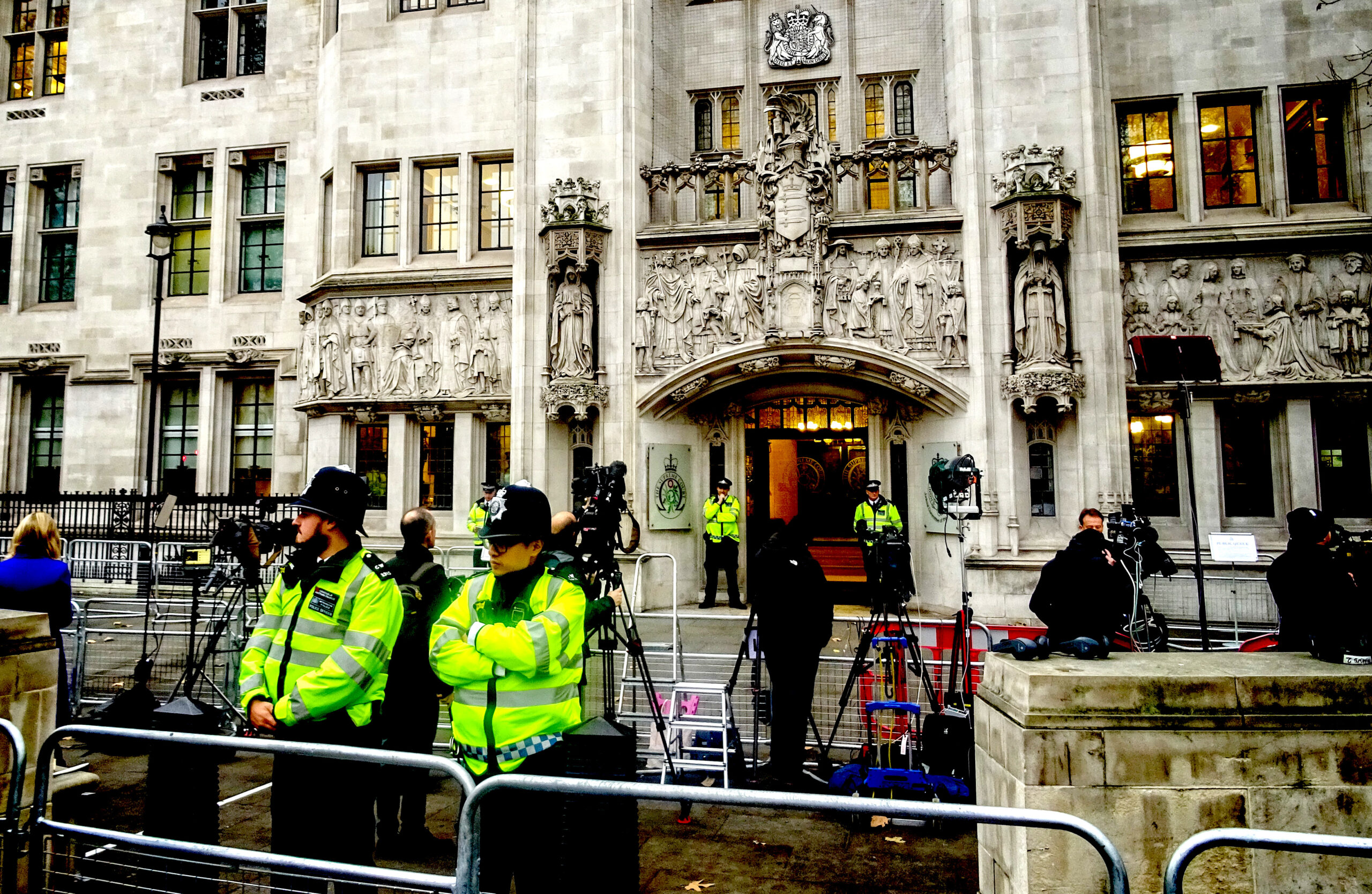
Outside the Supreme Court of the U.K. in London. (Gary Knight, Flickr, Public domain)
At page 24 the consultation paper confirms the abolition of the pubic interest defence. It rejects a proposal by the Law Commission for the appointment of an independent Statutory Commissioner to receive and investigate allegations of wrongdoing or criminality by the government and its agencies where public disclosure of those concerns would constitute an offence under Official Secrets law.
The Law Commission made this proposal in order to bring Officials Secrets law into alignment with Article 10 of the European Convention on Human Rights, which safeguards freedoms of speech and expression. The British government however says this proposal is unnecessary:
“….the Government believes that existing offences are compatible with Article 10 and that [the Law Commission’s] proposals could in fact undermine our efforts to prevent damaging unauthorised disclosures, which would not be in the public interest.
Whistleblowers anxious to expose wrongdoing or criminality by the government and its agencies must in future confine themselves to reporting their concerns to government ministers and to officials appointed by the government
Safeguards already exist (including existing processes for Government whistleblowers) which allow them to raise concerns without needing to undertake an unauthorised disclosure. These processes include; the possibility of raising a concern inside their own organisation, with the Cabinet Office, the Civil Service Commission, and even the chair of the Intelligence and Security Committee of Parliament. For former and current members of the security and intelligence agencies, there are additional offices to which disclosure can be made, creating a further set of safeguards for that group.
Henceforth the government and its prosecuting agencies are to be the sole determinants of whether or not a disclosure is in the public interest.
Any decision to prosecute [in a case of unauthorised disclosure] will be subject to the public interest test by the Crown Prosecution Service, and in most cases requires the consent of the Attorney General to prosecute.”
A British FARA
Elsewhere the consultation paper proposes the removal of the requirement for the prosecution in unauthorised disclosure cases to show “evidence proof or likelihood of damage” and, in imitation of the U.S. Foreign Agents Registration Act, it proposes setting up a “Foreign Influence Registration scheme” in Britain.
End of Investigative Journalism
Responding to concerns about the proposals, Prime Minister Boris Johnson, a former journalist, has said that he does not “think” the proposals would “interrupt the normal process” of the media:
“I’m full of admiration for the way journalists generally conduct themselves….Whatever this thing is, I don’t for one minute think it is going to interrupt the normal process.”
In reality the proposals are clearly designed to make whistleblowing, and reporting based upon whistleblowing, all but impossible. Henceforth whistleblowers who disclose unauthorised information, and journalists who publish it, will face prosecution on the same basis as spies working for a foreign power, even if they live and work outside Britain, and even if they are not British citizens. There will be no public interest defence, and prison sentences on conviction will be harsh, extending up to 14 years.
Official Secrets Act: home secretary's planned reform will make criminals out of journalists in Britain / UK https://t.co/IFVlho0lYL via @ConversationUK
— Jude Fleming, Press Freedom, GaslightingAssange (@flemingjude) July 23, 2021
A British Espionage Act
The similarity to the U.S. Espionage Act 1917 is striking, and the proposals are clearly intended to bring British official secrets law into full alignment with that of the United States.
There have even been rumours, which have been circulating for some time, that the new Act, which will replace the existing Official Secrets Acts, and which will incorporate the proposed changes, will actually be called “the Espionage Act.” See for example this article by Wired, published in 2017 during a previous stage of the consultation process, following publication of an earlier report on the need to “reform” official secrets law by the Law Commission.
The latest proposals, set out in the government’s recent consultation paper, actually go well beyond what the Law Commission proposed. Rumours that the new Act will be called “the Espionage Act” continue to persist, and the way the proposals equate whistleblowing and the unauthorised publication by the media of classified material with espionage, lends force to these rumours.
Prospective Merger of US/UK Official Secrets Law
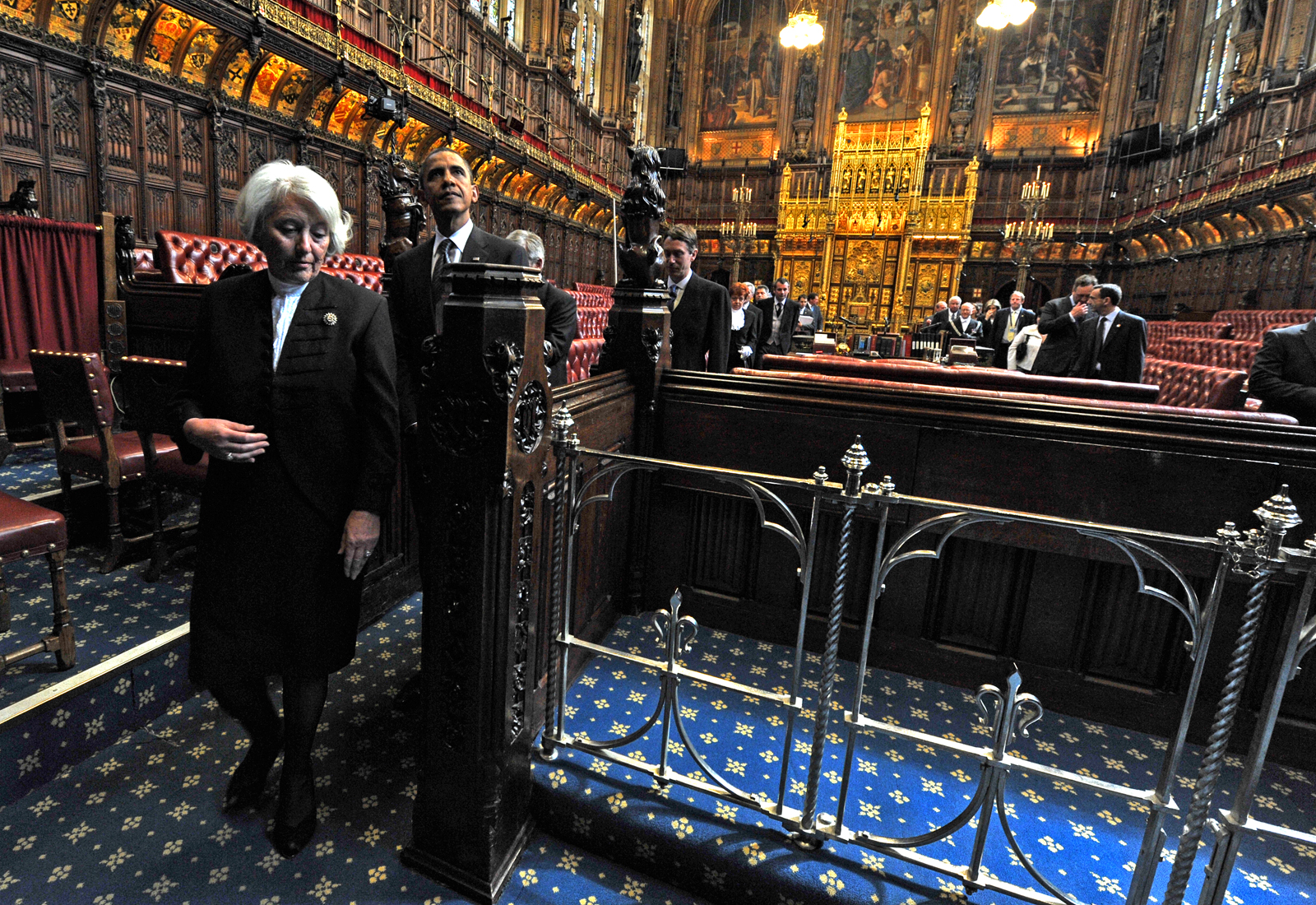
May 25, 2011: U.S. President Barack Obama in the Lords Chamber of U.K. Parliament. (UK Parliament, Flickr, CC BY-NC 2.0)
If this is so, then with two essentially identical “Espionage Acts” in operation on either side of the Atlantic, the evolution of official secrets law described by Lauria — extending back to the first British Official Secrets Act of 1889 — will be complete, with the two bodies of official secrets law, in Britain and in the United States, having essentially merged.
That the proposals will indeed be shortly incorporated in a new Act is moreover confirmed by the truncated nature of the “consultation process” of which the recently published consultation paper is supposed to be a part.
Though the consultation paper purportedly invited comments on its proposals, the consultation period only lasted from May 13 to July 22. That is far too short a period for a meaningful discussion of proposals which are so far reaching, showing that the “consultation” was not intended seriously.
The Suppression of Secrets
The consequence of these proposed changes – if they are enacted into legislation, as now seems certain – on meaningful investigating reporting in Britain, will be dire. In truth it will become all but impossible for meaningful investigating journalism that touches on government secrets to take place.
Journalists could face prison sentences of up to 14 years for stories that embarrass the Government under plans to reform the Official Secrets Act#journalists #kenyans#CongratulationsKikuyus #UhuRuto pic.twitter.com/owNuz7k7Co
— duncan (@duncanHustlerNa) July 21, 2021
A journalist like Assange, and an organisation like WikiLeaks, whose work is based on leaks of information provided by whistleblowers from within governments, would run enormous risks if they were to continue to work in Britain. (One wonders whether the government had Assange in mind when these proposals were drawn up. If he beats extradition, remaining in Britain could be precarious.) Were journalists to publish information the British government had classified as secret they would face prosecution and imprisonment for a term of up to 14 years. Moreover they would not have the limited protection which in the United States the First Amendment still provides.
Seminal Importance of Assange Case
In an earlier Letter from London I discussed the case against Julian Assange, and argued that his prosecution is ultimately driven by the alarm the U.S. and British governments feel over the way he and WikiLeaks have exposed their most terrible secrets, including their involvement in human rights violations and war crimes.
The single-minded determination with which the U.S. government is pursuing Assange, which I discussed earlier in this article, and the proposed changes to British official secrets law, which the British government has now announced, show the determination of both governments to conceal their secrets. Quite simply, they are determined that neither Assange, nor any other journalist, will expose their darkest and most terrible secrets in the same way again.
That alone is sufficient to show the seminal importance of the Assange case, which is now before the British High Court.
Alexander Mercouris is a legal analyst, political commentator and editor of The Duran.
The views expressed are solely those of the author and may or may not reflect those of Consortium News.


Am I the only one getting sick and tired of this clown Boris Johnson? He is pushing the UK into the ground.
The pursuit of Julian Assange by the British and US leaders at a time when it has been revealed that Sigurdur Ingi Thordarson, – the crucial witness that the US was relying on to make its case against Assange – has lied just shows how contemptible and hypocritical they are when they claim to respect the rule of law, justice and democratic ideals.
The information that Wikileaks revealed about the US and other governments exposed their corruption and crimes against humanity.
Julian Assange should now be freed. He has no case to answer. However, the leaders of governments that were corrupt and carried out crimes against humanity are the ones that should be in court facing long sentences for their actions.
If Britain and the US are truly leaders of the democratic world and truly believe injustice the steps to free Julian Assange should have already occurred.
Meanwhile, the US is using its “Jakarta method” (Remember the 1965 CIA/Indonesian military coup in which about 3 million people were massacred) e support for extreme right wing and repressive regimes and wiping out people who fight for freedom to ensure that the US policy makers have many client states to do its bidding.
These actions have been carried out in about 22 other countries.
This article by Alexander Mecourus is a “tour de force”, and absolute brilliant legal analysis !! Alex should win the Nobel Prize for conveying the coverup of the U.K. & U S. government’s efforts to suppress their criminality using Julian Assange as the culprit. Julian is a TRUE HERO in every sense of the word. He is the victim here; not the respective governments. I deeply feel for his plight.
“Henceforth the government and its prosecuting agencies are to be the sole determinants of whether or not a disclosure is in the public interest.” Right. The criminals will be the sole determinants of what’s legal and what ain’t. Cushy setup, if you love rotten government.
Thank you for documenting this dire activities, Alexander. Will the ground being lost ever be regained?
Not to worry. The UK has a robust constitutional system with an opposition party which will ensure no oppressive legislation is passed. The Labour party under Sir Keir Starmer QC, former Director of Public Prosecutions, is determined to… push the Tories further rightwards towards ever-greater secretiveness.
The word for this is tyranny.
“… there are cases where an unauthorised disclosure may be as or more serious, in terms of intent and/or damage … ” “… to the credibility and reputation of the government officials and agencies attempting to keep all knowledge of their own malfeasance and crimes from public revelation.”